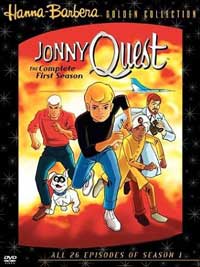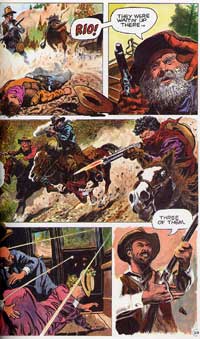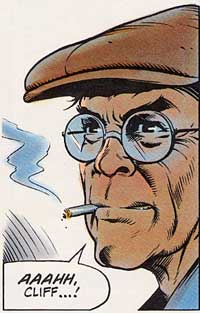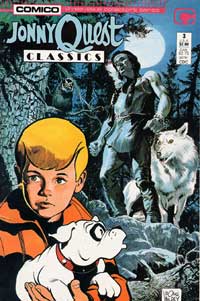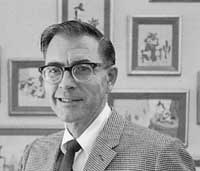Comics /
Cult Favorite
Jonny Quest: Remembering Mr Violence
By
Philip Schweier
May 9, 2004 - 14:45
Nostalgia is big business. A number of companies have made small fortunes by re-marketing old TV shows and movies, and offering books that tell us all about the making of our favorite cartoons and toys. We all have something from our younger years that holds a special place in our history.
For me, it was Jonny Quest, the original episodes of which are available on DVD as of May 11. Created by Doug Wildey for Hanna-Barbera in 1964, it was the first prime-time animated adventure series. The 26 episodes ran for two seasons, every Friday night at 7:30. Modest ratings couldn't justify the production expenses (about $65,000 per episode). In 1967, it made its way to Saturday morning where it was a main stay for many years.
I remember in 1970 my family took a trip out of town, and I was going to miss it. Not to worry, I thought; it will be on next week. The only problem was, it wasn't. It was September, and the new season began and Jonny Quest was off the schedule.
The late 1960s were a turbulent time for television. With the war in Viet Nam coming into living rooms by way of the evening news, media watch dogs and parenting advocates looked for ways to diminish some of the violence to which children were exposed. That included cartoons.
What had been hilarity, the simple notion of an anvil dropping on the head of a duck in a suit suddenly became cause for alarm. Jonny Quest was among the casualties. Doug Wildey once told the story of being called into a network programmer's office. They reviewed a segment of an episode in which a man in the ocean was being menaced by a shark. Race Bannon, Jonny's bodyguard, shot the shark with a Thompson machine gun.
With that, the network programmer accused Wildey of being "Mr. Violence." Wildey's response was something along the lines of "What's the problem? He shot the shark, not the man."
Nevertheless, Jonny Quest was history as far as the network was concerned. Wildey moved on to other projects. As the 1960s progressed, he served as a writer to cartoons based on Marvel Comics characters such as Iron Man and Captain America. He also drew comics, working for Dell, Gold Key and Marvel.
But Wildey returned to Saturday morning as well, this time working for Depatie-Freleng on their Planet of the Apes cartoon. Debuting in 1975, the show capitalized on the popularity of the films, while incorporating elements from Pierre Boulle's original novel. It also used a multi-chapter serial format, with each episode leading into the next to tell a cohesive story over the run of the series.
Again, the network stepped in over concerns of the ape army and their weapons. If it were possible for a child viewing the show to potentially imitate an element, an alternative had to be found. Rifles and handguns were forbidden, as were swords and other blade weapons. Clubs were an even bigger problem, given the number of kids who owned baseball bats. An army without arms isn't much of a challenge, so it was finally decided that it was pretty unlikely for a child to get his hands on a howitzer. "So when I had the army on the march, I had howitzers, as many as I could get," Wildey said.
Return to the Planet of the Apes lasted for one season. Saturday morning cartoon series rarely last more than a season or two, and Wildey hopped from one production to another. Among his credits are Valley of the Dinosaurs, Jana of the Jungle, Mr. T, Turbo Teens, and Godzilla, for which he also co-wrote the theme song.
Also during this time, he worked in comics. In the 1970s he drew a number of stories for DC, usually in one of their war titles or westerns. Another western title he worked on, Marvel's Outlaw Kid, holds up surprisingly well today. Unlike current comics, which feature an average of 3-6 panels over 4-6 pages per story, Outlaw Kid comics published in the 1950s featured 00 panels over 00 pages per story.
Originally, Wildey drew The Outlaw Kid in the 1950s. The stories are short on character development and long on action, much like many of the old western movies of that era.
Around 1970, Marvel began reprinting them, and it proved very popular. When their supply of Doug Wildey stories ran out, new artists began drawing new stories, and sales dropped, so Marvel began reprinting the stories yet again. Barely a year elapsed between second and third printings.
Westerns were always a favorite subject matter of his, often painting western scenes depicting characters in motion, usually from historical events. Wildey went onto create Rio, a western "gun for hire." Published first by Comico and later by Dark Horse, Rio is a well-written character by a comics master at a time when westerns have faded considerably from the comics landscape.
In 1982, Wildey took a deeper step into the world of comics. Dave Stevens, creator of the Rocketeer, featured a crusty character named Peavy in the Rocketeer's supporting cast based on Wildey.
Wildey returned briefly to his signature character, Jonny Quest, in 1986 when Comico licensed the concept for a new series of comics. While meant to expand the adventures of the boy hero, a few special issues featured adaptations of some of his most popular animated adventures, drawn by Wildey.
Also in 1986, Jonny Quest was revived by Hanna-Barbera in a new syndicated series, but it failed to measure up in the eyes of fans. Wildey had done a great deal of research on the settings and technology featured in the original show, so that the show would be grounded in the real world. The new version of the show was much more fantastic, including Hardrok, a living rock creature who had become Jonny's new bodyguard.
Wildey would also take on new animated life in an episode of the Real Adventures of Jonny Quest, another revival of the series which debuted in 1996. In one episode, Jonny travels out west to visit his grandfather at the DW ranch, where they discover a secret terrorist installation in the desert. Like his namesake, "Grandpa Doug" is a man of few words, preferring to let his actions do the talking.
"My whole life has been a simply telling stories in pictures," he said in a newspaper interview in 1993. "It might be kind of rare, but I have led a kind of golden life. I have very few complaints. I have enjoyed my life. And that's about all there is to it." Wildey passed away in October 1994 from heart failure at the age of 72.
Last Updated: November 29, 2025 - 16:51
